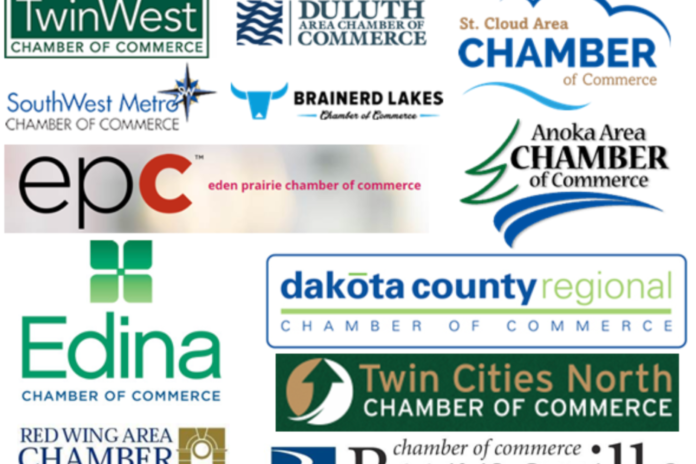Over 70 Minnesota chambers of commerce representing thousands of Minnesota, businesses have signed a letter telling Gov. Tim Walz, “It’s time to get Minnesota moving again.”
The May 5 letter sent to Gov. Walz, and copied to Minnesota House and Senate leaders, urges the governor to consider a “more rapid and equitable approach to safely open businesses of all sizes,” and points out the fact that even DEED Commissioner Steve Grove acknowledged last week that small businesses have borne a disproportionate amount of the economic burden.
Nearly half of Minnesotans own or work for a small business and (those small businesses) create two out of every three new jobs each year, the letter states.
RELATED: City of Lakefield resolves to stand against Gov. Walz shutdown orders
The letter signals that small businesses are being treated unfairly in the shutdown order compared to larger companies, and that larger companies and chain stores are being allowed to sell similar products as the smaller stores that are not being allowed to operate.
The letter highlights an example of a flower shop that specializes in selling plants and arrangements, which is currently not being allowed to operate (as a walk-in retail business), while a grocery store is allowed to sell similar type plants and floral products in addition to their core business of selling food.
The letter also states that small businesses are being financially challenged under the option to operate only with delivery or curbside service, a service option for which larger businesses may already have infrastructure in place, but would be an added cost or logistical issue for smaller businesses to offer.
The Anoka Area Chamber of Commerce, with nearly 600 members, is one of the organizations that signed the letter. Responding to an email inquiry, President Peter Turok said that he’s heard from “many” member businesses that are struggling due to the shutdown and he estimated that about 30% of the organization’s member businesses are being limited under the shutdown.
Calls from members are “ramping up more and more,” he said, “they are desperate to reopen.”
Other chamber organizations that added their signatures to the letter include the Brainerd Lakes Area, Dakota County Regional, Duluth, Edina, Eden Prairie, Fergus Falls Area, Greater Mankato Growth, Red Wing Area and St. Cloud Area as well as the Southwest Metro, TwinWest and Twin Cities North Chambers.
RELATED: Churches and Businesses Take Walz To Federal Court Over Shutdowns
Missing from the list of chambers that signed the letter are the Minneapolis Regional Chamber and the Saint Paul Area Chamber.
An email response from the president and CEO of the Minneapolis Regional Chamber of Commerce (MRC), Jonathan Weinhagen, stated that they were not approached to sign the letter. The MRC’s website states that they have over 1,500 businesses on their membership rolls. Weinhagen didn’t offer responses to questions about how many of their members’ businesses are included in the shutdown orders or whether they have heard from members who claim they may not be able to resume business once the shutdown order is lifted.
Email inquiries requesting information about businesses impacted by the shutdown went unanswered from both the Bloomington Chamber and the Northeast Minneapolis Chamber, which are part of the MRC and were also not included on the letter to Walz. A similar email inquiry to the St. Paul Area Chamber also went unanswered.
Several businesses in Northeast Minneapolis have already shutdown permanently including veteran-owned Prohibition Barbers, Sleepy-V’s, Ginger Hop/Honey, and NE Arcade.
The northeast corner of Minneapolis has become a social and gastro “destination” with its artist studios, taprooms, breweries and range of authentic ethnic dining options. Its businesses are now struggling to find ways to cope with the forced shutdown by scrambling to offer delivery and take out options.
For some, that’s not enough. Long-time family business operator Bill Kozlak, owner of the venerable Jax Bar and Café in Northeast Minneapolis, made an impassioned plea in a video posted on Hospitality Minnesota’s YouTube channel. “My great-grandfather built this building… in 1910.” He said the business and its third-generation employees have “survived the polio epidemic, survived WWII, survived 9-11. Survived just about everything,” he said, “not sure we’re gonna survive this one.”
They had to lay off all their employees, Kozlak said, and closed on 16 hours’ notice, which was “very painful, very expensive.” In the video, Kozlak pleaded with state and federal leaders to come up with a financial help plan for businesses like his so that he can keep his workers employed. Even when they’re allowed to open back up, it may be with capacity restrictions and that would not be financially sustainable in the long-term, he said.
RELATED: Half of Minnesota’s Hospitality Businesses May Close Permanently Amidst Walz Shutdowns
A recent report states that half of Minnesota’s hospitality businesses may be forced to close permanently in the next two months under Walz’ shutdown orders, according to Hospitality Minnesota. The industry employs over 290,000 workers and accounts for approximately 10% of Minnesota’s workforce, according to Minneapolis/St. Paul Business Journal.
In the chambers’ letter to Walz they said they believe that “all” businesses are essential, and they want the governor to give more equitable consideration to who is deemed “essential.”
The chambers say they are working with their members on health and safety protocols for their re-opening plans. The letter states that they are confident in the ability of the businesses “to do the right thing” to open in the safest way possible and do it “equally as well as their larger counterparts.”
“It’s just too early to really know what the effect of the shutdown will have until it ends,” Anoka Chamber’s Turok said. “Their additional fear is that when they can reopen, that business will be slow to come back.”

















